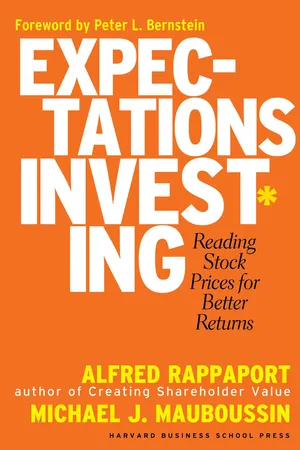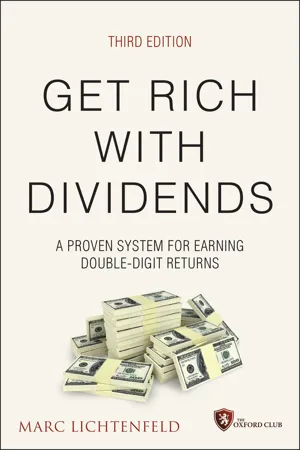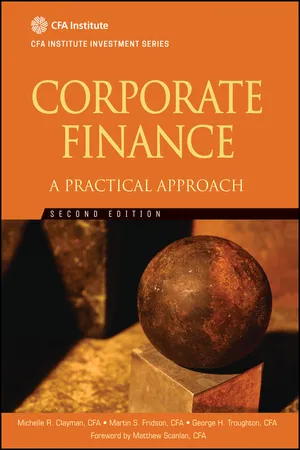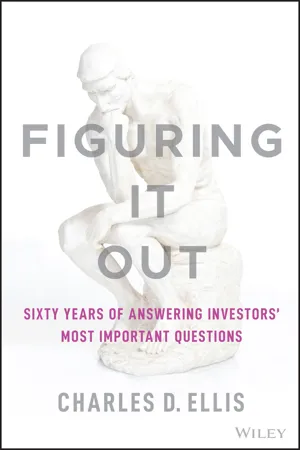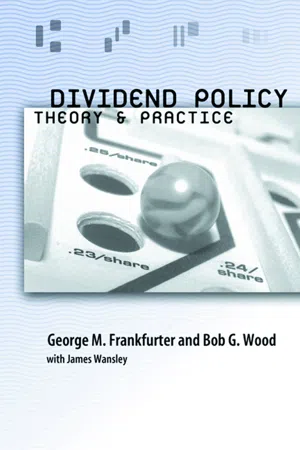Business
Buybacks
Buybacks refer to a company repurchasing its own shares from the open market, effectively reducing the number of outstanding shares. This can lead to an increase in the value of the remaining shares and can be seen as a way for a company to return value to its shareholders. Buybacks are often used as a means of deploying excess cash or improving financial ratios.
Written by Perlego with AI-assistance
Related key terms
1 of 5
9 Key excerpts on "Buybacks"
- eBook - PDF
Expectations Investing
Reading Stock Prices for Better Returns
- Alfred Rappaport, Michael J. Mauboussin(Authors)
- 2003(Publication Date)
- Harvard Business Review Press(Publisher)
mergers and acquisitions 169 The popularity of share Buybacks has catapulted since the early 1980s. In the United States alone, corporate expenditures on share Buybacks as a percentage of earnings were ten times higher in the late 1990s than they were in 1980. In the late 1990s, for the first time, companies spent more money repurchasing their shares than paying dividends. 1 Share Buybacks are also flourishing globally. In recent years, countries like the United Kingdom and Canada have seen an increase in activity while other nations that previously prohibited Buybacks, including Germany and Japan, have adopted provisions to make them acceptable. Notwith-standing this surge in popularity (table 11-1), the impact of Buybacks on shareholder value—and hence on the expectations investor—has never been more ambiguous. [[AR 11-1]] Under the right circumstances, Buybacks provide expectations investors a signal to revise their expectations about a company’s prospects. Indeed, share Buybacks are a very effective way for managers to increase their company’s share price when they have more bullish beliefs about their company’s prospects than investors do. The signal, however, is not always clear. Buybacks serve a crosscurrent of interests, which can leave investors with little if any trace of a meaningful signal. 171 11 share Buybacks In this chapter, we develop guidelines for evaluating share-buyback programs. We start with our primary interest: to identify when buyback announcements offer a credible signal to revise expectations. We go on to present a golden rule that we can use to evaluate all buyback pro-grams. Finally, we apply the golden rule as a benchmark to evaluate the most popularly cited reasons for share Buybacks. So what should you do when a company announces a share-buyback program? First, you must decide whether management is pro-viding a credible signal that the market should revise its expectations. - eBook - ePub
Get Rich with Dividends
A Proven System for Earning Double-Digit Returns
- Marc Lichtenfeld(Author)
- 2023(Publication Date)
- Wiley(Publisher)
4Think about that for a second. Insiders, who know the most about the company (and are sometimes the individuals responsible for the company buying back its stock), sell big chunks of their own shares more often when the company is buying back stock.A company repurchasing its shares increases demand for the stock and can lift prices, enabling the insiders to sell at a more favorable price.How that isn't considered a conflict of interest is a mystery. And how shareholders aren't lined up with pitchforks at annual meetings when they see the CEO or CFO selling while the company is buying is shocking.Companies often refer to Buybacks as “returning cash to shareholders.” But Yardeni Research concluded that “Buybacks have more to do with paying employees with stock grants than returning cash to shareholders.”5When a company pays a dividend, that's real. It's not part of an authorization plan that may or may not be executed. If a company says it's going to pay $1 per share in dividends this year, then by all means, it had better pay $1 per share in dividends—or else the stock will get crushed.A dividend declaration is like a vote of confidence by management not only affirming that there will be enough cash to pay the dividend and run the business but also stating that it has set an expectation for a certain level of earnings and cash flow.If it is forced to cut the dividend in the future—or, in the case of a company that has been raising the dividend year after year, to keep the dividend at the same level—the stock will be hit hard. Management knows this and recognizes that establishing or raising a dividend is akin to setting the bar at a higher level and telling shareholders that the company will at least reach that level of success. - eBook - PDF
- Scott Besley, Eugene Brigham, Scott Besley(Authors)
- 2021(Publication Date)
- Cengage Learning EMEA(Publisher)
8 13-5 STOCK REPURCHASES Rather than paying regular cash dividends, firms some- times distribute earnings by repurchasing shares of their own stock in the financial markets. The primary reasons given for repurchasing stock are as follows: 9 1. To distribute excess funds to stockholders—Firms sometimes use stock repurchases to distribute funds that exceed capital budgeting needs in a particular year, especially when the price of the stock is con- sidered low (undervalued). A firm might repurchase stock to distribute excess funds because, unlike regu- lar dividend payments, a stock repurchase generally is not expected to continue in the future. Further, a repurchase has different tax implications than a cash dividend. With a repurchase, because investors sell their stock to the company, any gains they realize generally are taxed at the capital gains rate, which often is lower than the ordinary tax rate at which dividends are taxed. 2. To adjust the firm’s capital structure—When a firm has more equity than its target capital structure suggests, it might issue debt and use the proceeds to repurchase shares of stock to bring the mix of debt and equity in line with the target. 3. To acquire shares needed for employee options or compensation—If a firm knows many of the stock options that have been “paid” to employees as bonuses or incentives will be exercised soon, it might buy back shares in the financial markets to ensure sufficient shares are available when the options are exercised. Such repurchases also help support the price of the stock by reducing the dilution effect that occurs when employee stock options are exercised; that is, a repurchase reduces the impact on the market value of the stock that otherwise occurs if the number of shares of stock is increased by the number of exercised options. - eBook - ePub
Corporate Finance
A Practical Approach
- Michelle R. Clayman, Martin S. Fridson, George H. Troughton(Authors)
- 2012(Publication Date)
- Wiley(Publisher)
In general, when an amount of share repurchases is authorized, the company is not strictly committed to carrying through with repurchasing shares. This situation contrasts with the declaration of dividends, where that action does commit the company to pay the dividends. Another contrast with cash dividends is that whereas cash dividends are distributed to shareholders proportionally to their ownership percentage, share repurchases in general do not distribute cash in such a proportionate manner. For example, if repurchases are executed by a company via buy orders in the open market, cash is effectively being received by only those shareholders with concurrent sell orders.Among the reasons that corporations have given for engaging in share repurchases are the following:- To communicate that management perceives shares in the company to be undervalued in the marketplace or more generally to support share prices—this motivation was the most frequently mentioned by U.S. chief financial officers in one survey.19
- Flexibility in distributing cash to shareholders—share repurchases permit the company’s management flexibility as to amount and timing and are not perceived as establishing an expectation that a level of repurchase activity will continue in the future.
- Tax efficiency in distributing cash, in markets in which the tax rate on cash dividends exceeds the tax rate on capital gains.
- To absorb increases in shares outstanding resulting from the exercise of employee stock options.
Other motivations for a share repurchase are also possible. For example, share repurchase might merely reflect that the corporation has accumulated more cash than it has profitable uses for and does not want to pay an extra cash dividend.The next section presents the means by which a company may execute a share repurchase program. 4.1. Share Repurchase Methods Following are the four main ways that companies repurchase shares, listed in order of importance.1. Buy in the open market. This method of share repurchase is the most common, with the company buying its own shares as conditions warrant in the open market. Theopen market share repurchase method gives the company maximum flexibility. Open market repurchases are the most flexible option for a company because there is no legal obligation to undertake or complete the repurchase program—a company may not follow through with an announced program for various reasons, such as unexpected cash needs for liquidity, acquisitions, or capital expenditures. In the United States, open market transactions do not require shareholder approval. Because shareholder approval is required in Europe, Vermaelen (2005) suggested that all companies have such authorization in place in case the opportunity to buy back undervalued shares occurs in the future.20 - eBook - ePub
- (Author)
- 2021(Publication Date)
- Wiley(Publisher)
Management of a company may view its own shares as undervalued in the marketplace and hence a good investment. Although management’s stock market judgment can be just as good or bad as that of any other market participant, corporate management typically does have more information about the company’s operation and future prospects than does any outside investor or analyst. Furthermore, share repurchases via open market purchase, the dominant repurchase mechanism, allow management to time share repurchases with respect to market price. The announcement of a share repurchase program is often understood as a positive signal about the company’s prospects and attractiveness as an investment. An unexpected announcement of a meaningful share repurchase program can often have the same positive impact on share price as would a better-than-expected earnings report or similar positive event. In the days following the global stock market crash of October 1987, a number of prominent companies announced huge Buybacks in an effort to halt the slide in the price of their shares and show confidence in the future. It may have been an important aspect in the stock market recovery that followed. Some investment analysts, however, take issue with the notion that initiation of share repurchases is a positive signal, because a repurchase program could mean that the company has no new profitable investment opportunities and is thus returning cash to shareholders.Unlike regular cash dividends, share repurchase programs appear not to create the expectation among investors of continuance in the future. Furthermore, in contrast to an announced dividend, the announcement of a share repurchase by open market purchase does not typically create an obligation to follow through with repurchases. Additionally, the timing of share repurchases via open market activity is at managers’ discretion. Share repurchases also afford shareholders flexibility because participation is optional, which is not the case with the receipt of cash dividends.For some companies, share repurchases are used to offset the possible dilution of earnings per share that may result from the exercise of employee stock options. Whether stated or not, many companies try to repurchase at least as many shares as were issued in the exercise of stock options—even though the options are typically exercised at lower prices than the repurchase price. - eBook - PDF
- Robert Parrino, David S. Kidwell, Thomas Bates, Stuart L. Gillan(Authors)
- 2021(Publication Date)
- Wiley(Publisher)
In addition, stockholders who sell shares back to a company pay taxes only on the gains they realize, and historically these capital gains have been taxed at a lower rate than dividends. From management’s perspective, stock repurchases provide greater flexibility in distribut- ing value. We have already discussed how stock prices react to announcements of changes in dividend payments. We can therefore imagine why managers might find stock repurchases rela- tively more attractive. Even when a company publicly announces an ongoing open-market stock repurchase program, as opposed to a regular cash dividend, investors know that management can always quietly cut back or end the repurchases at any time. In contrast, dividend programs represent a stronger commitment to distribute value in the future because they cannot be quietly ended. For this reason, investors know that managers will initiate regular cash dividends only when they are quite confident that they will be able to continue them for the long run. Thus, if future cash flows are not certain, managers are likely to prefer to distribute extra cash today by repurchasing shares through open-market purchases because this enables them to preserve some flexibility. If cash flows decline in the future, management can reduce the repurchases without a pronounced effect on the company’s stock price. Potentially offsetting the advantages of stock repurchases are a few notable disadvan- tages. One of these disadvantages is the flip side of the signaling benefit discussed in the pre- vious paragraph. Since most ongoing stock repurchase programs are not as visible as dividend programs, they cannot be used as effectively to send a positive signal about the company’s prospects to investors. 17.3 Dividends and Firm Value 17-15 A more subtle issue concerns the fact that managers can choose when to repurchase shares in a stock repurchase program. - eBook - ePub
Figuring It Out
Sixty Years of Answering Investors' Most Important Questions
- Charles D. Ellis(Author)
- 2022(Publication Date)
- Wiley(Publisher)
1 Usually, however, repurchase has been viewed only as a defensive device to avoid dilution. Various reasons are given to justify expenditures on a reacquisition of shares. For instance, it is argued that repurchase will:- Avoid diluting earnings per share when stock options are granted and exercised by management.
- Supply shares for employee stock-purchase programs.
- Obtain shares for common stock bonuses to employees.
- Provide shares for stock dividends.
- Avoid diluting earnings per share when convertible securities are changed into common stock.
- Increase the per-share asset value of investment companies when shares sell at a discount in the market.
- Eliminate small odd-lot holdings, which are inordinately costly to service.
- Compensate for the dilution of earnings per share which is incurred in a merger through exchange of shares.
- Provide the means to acquire other companies. (It is ironic that many companies are proud of their policy of making acquisitions only with cash, “to avoid equity dilution.” Yet, because of the federal tax on capital gains in a cash sale, sellers fare better with exchanges of stock than cash payments and will usually accept a proportionately lower purchase valuation when these taxes can be avoided. For example, assuming a 25% capital gains tax on a cash transaction, and assuming the stock alternative qualifies as nontaxable, $100 in stock may be worth $133 in cash to the seller. Consequently, the acquiring company's stockholders' equity would be far less “diluted” if payment were made in shares previously acquired for this purpose in the open market for only three-quarters of the money needed for a cash transaction.)
Repurchase programs which are undertaken for the foregoing reasons occasionally result in a sizable volume of trading. For instance, General Motors' repurchases in 1964 amounted to 1,136,457 shares—or 10.5% of the volume in this stock on the New York Stock Exchange. As a rule, however, such reacquisitions do not lead to significant changes in the number of outstanding shares because purchasing is done specifically for reissue. In a recent study, Barron's found only 100 companies (out of several thousand listed on the major stock exchanges) with more than nominal holdings of their own stock; even in this group most companies were found to hold less than 3% of their total stock and were simply anticipating employee stock options and other similar programs.2 - eBook - PDF
Dividend Policy
Theory and Practice
- George Frankfurter, Bob G. Wood, James Wansley(Authors)
- 2003(Publication Date)
- Academic Press(Publisher)
In a press release, at the internet website www.admin.uiuc.edu/NB/99.12/stocktip.html, titled “Firms Gain Value When They Don’t Repurchase Stock, Study Shows,” one finds the following text: 212 Chapter 15 CHAMPAIGN, Ill. It has become almost a truism on Wall Street that stock repurchases by a company increase the value of the firm. From Intel Corp. to Walt Disney, so many companies have bought back shares of their own stock in the last 15 years that “a major realignment of corporate financial policy” has taken place in America, says James A. Gentry, a finance professor at the University of Illinois. In 1996 alone, corporate stock buy backs hit a record $176 billion compared with under $2 billion for the entire decade of the 1960s. Management repurchasing of stock through tender offers or on the open market is taken by investors as a pos-itive sign that the firm is posed for future growth or that the stock is undervalued. Hence, an upward bounce of the share price invariably takes place after a repurchase announcement. But do companies that buy back stock actually experience higher long-run growth than companies not pursuing a repurchase strategy? In the first comprehen-sive study of this question, Gentry and John P. Evans, a finance professor at the Curtin University of Technology in Australia, studied 369 companies that announced 398 repurchase programs from 1978 through 1993. Financial and market data were collected for each company for two years prior to the announcement. The minimum period of study following repurchase was two years, while the maximum period was 17 years. The large majority of the companies were listed on the New York Stock Exchange. Gentry and Evans found that “firms create more value with a strategy of not repurchasing their shares.” Non-repurchasing firms had a 20.8 percent mean growth rate, while repurchasing companies had a mean rate of 16.5 percent. - eBook - PDF
- Robert Parrino, David S. Kidwell, Thomas Bates(Authors)
- 2016(Publication Date)
- Wiley(Publisher)
How Shares are Repurchased Companies repurchase shares in three general ways. First, they can simply purchase shares in the market, in the same way an individual would. These kinds of purchases are known as open-market repurchases and are a very convenient way of repurchasing shares on an ongoing basis. For example, a company might use such repurchases to distribute some of its profits instead of paying a regular cash dividend. When a company has a large amount of cash to distribute, open-market repurchases can be cumbersome because there may be limits on the number of shares that a company can repurchase over a given period. These limits, which are intended to restrict the ability of firms to influence their shares price through trading activity, mean that it could take months for a company to dis-tribute a large amount of cash using open-market repurchases. When the management of a company wants to distribute a large amount of cash at one time and does not want to use a special dividend, it can repurchase shares using a tender offer . A ten-der offer is an open offer by a company to purchase shares. 4 There are two types of tender offers: fixed-price and Dutch auction. With a fixed-price tender offer, management announces the price that will be paid for the shares and the maximum number of shares that will be repurchased. open-market repurchase The repurchase of shares by a company in the open market. tender offer An open offer by a com-pany to purchase shares. DIVIDENDS, SHARE REPURCHASES AND PAYOUT POLICY 582 Interested shareholders then tender their shares by letting management know how many shares they are willing to sell. If the number of shares tendered exceeds the announced maximum, then the maximum number of shares is repurchased and each shareholder who tendered shares par-ticipates in the repurchase in proportion to the fraction of the total shares that he or she tendered.
Index pages curate the most relevant extracts from our library of academic textbooks. They’ve been created using an in-house natural language model (NLM), each adding context and meaning to key research topics.
